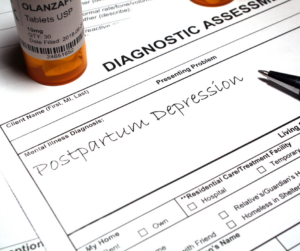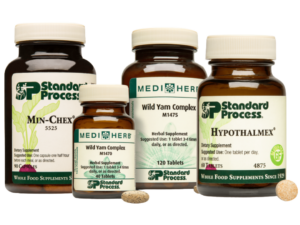By Claire Bacon, ACN, CNC
Post-partum depression is a widespread yet unspoken problem among women. Somewhere between 10-14% of new mothers experience post-partum depression. There is a certain level of shame associated with it, so women often keep it a secret. They often know something is wrong, however try to just “push through” on their own. Husbands often don’t understand – partly because they don’t see it as they spend most of the day at work, but also don’t understand the huge hormonal fluctuation surrounding the birth process.
As a result of all these factors, post-partum depression is largely untreated. Women unnecessarily suffer in silence while life goes on without us. It can be devastating to personal relationships, marriage, and can even lead to neglect of the child. As the condition worsens, it can also involve anxiety, panic, OCD, PTSD, or psychosis. Feeling this way can endanger the life of the mother as well as children, as emotions and inner turmoil quietly brew.
Post-partum depression may last for months before hormones and outlook get back to normal. However, most women eventually recover. Wouldn’t it be great to speed up recovery or prevent the problem in the first place?

Risk Factors for Post-Partum Depression
During pregnancy, the body turns its focus to the #1 most important thing – growing a baby! The body will preferentially send nutrients and minerals to the baby, at the expense of the mother. Anything the baby needs, if not supplied in the diet, will get pulled from the mother’s tissues and bones. This can leave a new Mom feeling very depleted and not like herself.
After the birth, the body turns to breastfeeding. This can also be a very draining process, as there is continued demand on the mother’s body to produce milk. On top of that, there is a huge emotional burden if the milk supply is not enough. Women often don’t get the physical or emotional support to deal with difficulties in breastfeeding. It’s potentially the most trying time in a woman’s life. These physical and emotional demands can steal so many resources from the body, that mental health can suffer.
Mental health is a top priority anytime – but especially following childbirth. You’ve just gone through a 9-month period of high estrogen and a changing, uncomfortable body. Maybe the birth experience had some unexpected complications. And now you may have some physical complaints that need time to heal – for instance, from a C-section or episiotomy.
At a minimum, you need some sleep to recover! But there’s no time for that. Your whole life has changed – now you have more responsibilities. There is a tiny human who needs to be fed every two to three hours, along with changings and still taking care of the rest of the household. At this time, you need additional capacity for managing physical and emotional stress, but often we are left with less resources to handle everything that’s on our plate.
With a nutritional strategy, these are our goals: to uplift the endocrine system, to restore minerals that have been lost, and to replenish need good, full fats and B vitamins that support a happy brain. These methods provide a long-term solution for a happy, healthy life – much better than placing all your hope in a prescription!

Top 3 Things You Can Do:
#1 You probably already know, solid nutrition is paramount to your mental health. We want to follow a nutrient dense, high fat diet similar to the Weston A. Price diet. This our favorite diet for pre-conception, all the way through pregnancy, and during the post-partum period. You want to eat fatty fish like salmon, good fats from raw nuts and seeds, raw milk from a local farmer or pet shop, and whole eggs. Egg yolks are a great source of choline – excellent for the brain – not only yours, but for baby’s brain, too!
#2 Before childbirth, you want to plan ahead to get your placenta encapsulated. This is a special process and must be done by someone who is certified. You take a couple pills every day, and these nutrients from your own body help to restore your hormones and nutritional status. Placenta is the ultimate multivitamin!
#3 If you didn’t plan ahead to do that, (or even if you did) you can eat organic calf liver several times a week (great source of vitamin A and B vitamins) to nourish your body. We can offer you our Liver pate recipe, and Liver meatballs recipe for a good start!

Other Tips for Taking Action:
- Find someone to talk to — a therapist, friend, or family member who will listen without judgement.
- Join a support group for new parents.
- Try to eat homemade and traditional fermented foods, such as sauerkraut, kim chi and kefir.
- Prioritize rest for yourself. Why watch TV when you could be sleeping?
- Plan workouts or walks outdoors with your friends.
- Find time for self-care and your pre-baby hobbies.
- Hire help or ask your neighbors or friends to cover occasional household chores or errands.

And of course, you can take a few supplements to cover the things you can’t get in your diet…
Helpful Supplements:

- Hypothalmex contains the “nuts and bolts” to help your hypothalamus gland work. The hypothalamus is like the “master conductor” of your endocrine system. It’s responsible for your mood, outlook, and positivity. It coordinates all the hormonal messaging between your endocrine glands.
- Min-Chex is one of our top-selling products because it works so well. It’s a blend of calming minerals, with a little calcium, a little iodine, and vitamins B3 and B6. It helps your calming neurotransmitters work, so you’re not so stressed. It backs you away from “the edge” where you’re not so prone to burst into tears.
- Wild Yam Complex is an herbal blend that supports progesterone production – a happy, laid-back hormone. Contains Wild Yam, Shatavari, St John’s Wort, Sage, Black Cohosh and Korean Ginseng. These herbs support mood and positivity, support estrogen and progesterone balance. They can be considered adaptogens that support resilience to stress, so wonderful for a number of reasons! My only caution would be if you tend to have heartburn/reflux – can irritate the stomach lining if it’s already weak.
Please call our office at (404) 973-0188 if interested in a personalized consult.
Looking Ahead…
It always helps to have a way to put things in perspective. When you’re being pulled in all directions, remember that this is hard, but it’s still the moment you’ve dreamed of your whole life. You always knew motherhood would bring challenges, but you wanted to do it anyway. Think of the blessing and opportunity that God has given you to be a mom! Not everyone gets this chance. You may feel like the weight of the world is on your shoulders, but the truth is that multiple people within your circle would be glad to help, if you would not be afraid to ask.
The same goes for your physical health. If you haven’t been satisfied with the care from your current doctor, you are under no obligation to suffer in silence. Reach out for a new strategy that addresses you as a whole person – someone with diverse needs for hormonal support, digestive/gut health support, and dietary guidance.

We are always here for you and ready to help!


